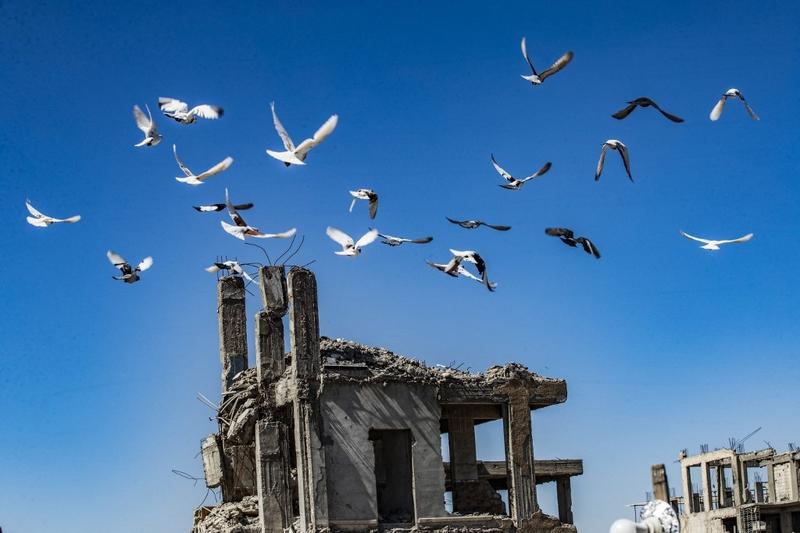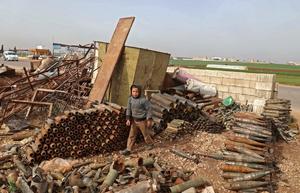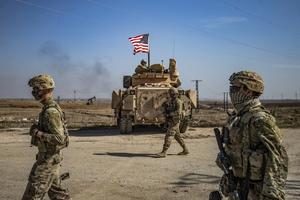 The pigeons from a Syrian keeper fly over damaged homes in Syria's east central city of Raqa on March 13, 2021. (DELIL SOULEIMAN / AFP)
The pigeons from a Syrian keeper fly over damaged homes in Syria's east central city of Raqa on March 13, 2021. (DELIL SOULEIMAN / AFP)
DAMASCUS - The Syrian crisis entered its 11th year on Monday with no solution yet to bring an end to the suffering of the people amid the lack of international consensus, which is seen by experts as a must in order to end the prolonged war.
Several international meetings have taken place throughout the years to push the Syrians into reaching a formula to help end the crisis. However, such meetings reflected the clash of interests of superpowers and eventually led to nothing concrete to end the crisis.
The "economic war" is the title of the 11th year of the Syrian war, Maher Ihsan, a political expert, told Xinhua, noting that such an economic war reflects the fact that the Western powers and the United States still have unachieved interests in Syria
At first, Western powers and the US-supported rebel groups were in a bid to achieve a regime change in Syria or to push the Syrian government to give concessions in regional files and issues. Later, the support turned into an actual presence on the ground with the United States, in particular, establishing many bases in northeastern Syria.
The presence of the US forces in Syria, which started in 2015, was seen as the main obstacle in the face of finding a solution to the crisis. The United States said it was fighting the Islamic State (IS) group in northeastern Syria. But later, it turned out that the United States was empowering Kurdish militias in that part of the country to establish a popular base in areas where its forces are located.
In recent years, the Syrian army, with the help of its Russian and Iranian allies, managed to regain much of the country back. And the United States has upped its sanctions on the Syrian government to suffocate the country economically with the aim of achieving in economy what it could not achieve militarily.
This has resulted in a tough economic hardship in the country, with the majority of people reeling under the pressure of skyrocketing prices and the lack of basic necessities.
 A Syrian child walks amidst neutralised ordnance shells at a metal scrapyard on the outskirts of Maaret Misrin town in the northwestern Idlib province, on March 10, 2021. (AAREF WATAD / AFP)
A Syrian child walks amidst neutralised ordnance shells at a metal scrapyard on the outskirts of Maaret Misrin town in the northwestern Idlib province, on March 10, 2021. (AAREF WATAD / AFP)
The "economic war" is the title of the 11th year of the Syrian war, Maher Ihsan, a political expert, told Xinhua, noting that such an economic war reflects the fact that the Western powers and the United States still have unachieved interests in Syria.
After ten years of war, there is still no real indication about a near end to the crisis and the reason is that the regional and international powers have become the active factors in the crisis, not the opposition groups.
Khalaf al-Muftah, Syrian political expert
ALSO READ: UNICEF: Toll on war's youngest victims to haunt Syria
As for where the crisis is going, Ihsan said that the solution is no longer in the hands of the Syrians themselves as the crisis has become of an international nature due to the number of international players involved in it.
"As long as there is no international consensus to resolve the crisis, the war could drag on for many more years with no solution in sight and the increasing economic pressure means that there is no consensus yet," he said.
Regional files are also in play here, he added, noting that the United States and Israel want to achieve a goal to end the Iranian influence in Syria, which is not happening anytime soon as Iran has played an important role in the fight against the terror-labeled groups in Syria and is a strong ally to the Syrian government of President Bashar al-Assad.
 This AFP graphic shows the map of Syria with the forces and their areas of control, as of March 3, 2021.
This AFP graphic shows the map of Syria with the forces and their areas of control, as of March 3, 2021.
For his side, Khalaf al-Muftah, another Syrian political expert, stressed that the International and regional clash of interests and points of view is "complicating the political landscape" in Syria.
"After ten years of war, there is still no real indication about a near end to the crisis and the reason is that the regional and international powers have become the active factors in the crisis, not the opposition groups," he said.
Al-Muftah stressed that the lack of the political will to resolve the crisis is delaying reaching for a final solution to end the crisis, noting that some international and regional powers want to dictate conditions on the Syrian government to end the crisis, meaning that they have an agenda and want the Syrian government to agree on it in order for them to end the crisis.
"Therefore, there is no near or quick end to the crisis due to the clash between the International powers on Syrian soil," he said.
Experts also expected that the situation might get aggravated in the next few months due to the Western pressure on the Syrian government ahead of the Syrian presidential elections slated for May.
 US soldiers walk while on patrol by the Suwaydiyah oil fields in Syria's northeastern Hasakah province on Feb 13, 2021. (DELIL SOULEIMAN / AFP)
US soldiers walk while on patrol by the Suwaydiyah oil fields in Syria's northeastern Hasakah province on Feb 13, 2021. (DELIL SOULEIMAN / AFP)
A day earlier, the Europe Union said it will renew sanctions against the Syrian government in May, noting that the conflict in the war-torn country is still far from a solution, and calling on the government to end repression and release all detainees.
READ MORE: US forces 'deploy new defense systems in Syria bases'
While the international clash of interests is ongoing, the suffering of the Syrian people is increasing with the worsening economic situation and the continued displacement as the Western sanctions are hindering the reconstruction process of the destroyed places in Syria.


